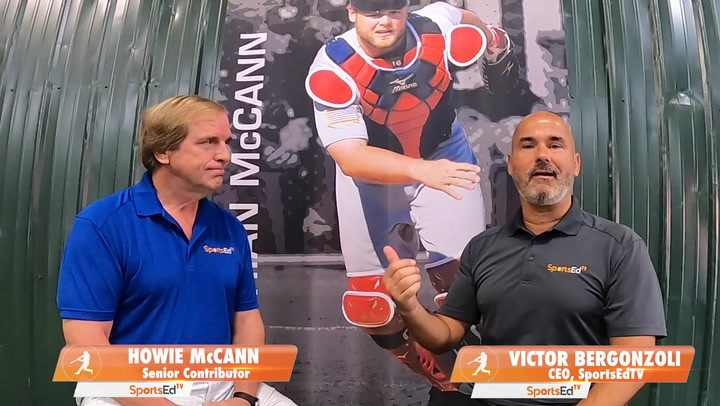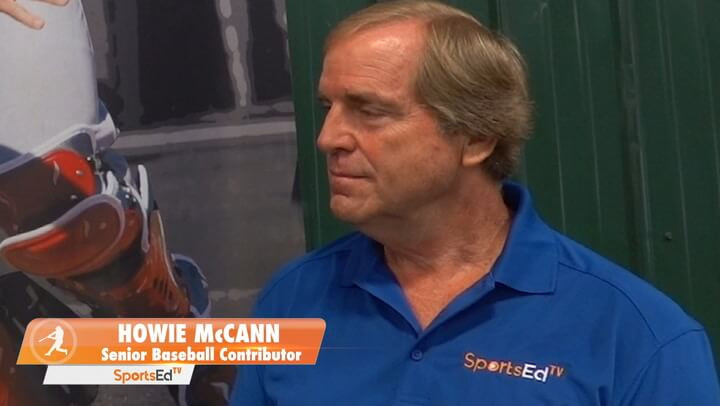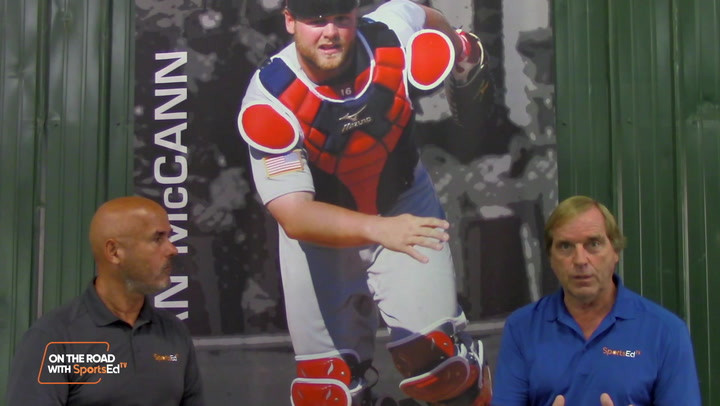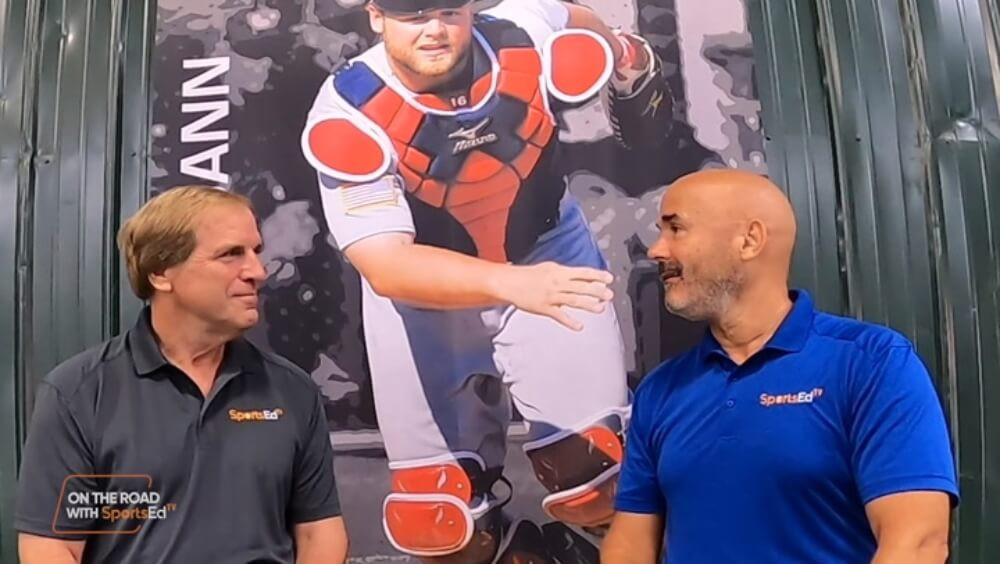Baseball
Welcome and thanks for visiting...

SportsEdTV Talks to Howie McCann (Age 6 to 9)
This is on the road with SportsEdTV
VB: We are back with Howie McCann. Last time we spoke about ages three to six. What you do with your kid, you know, playtime, not being too serious in overanalyzing. And now we are getting into the age that things are getting serious. So, tell us about it.
HM: Well, ages six to nine are huge three years period. The first three or four or five years you're playing with your son. It's fun. As you get into six now you're preparing your son to get into Little League in my area it was called before Little League and minor league was the kids not old enough to play Little League under nine or not good enough to play a Little League. You had to try out to make the team so minor league was a huge deal.
The emphasis gets your son or daughter better and the motor skills are getting better. They're getting more in tune. What they want to do, they're starting to throw harder and understanding the game, their motor skills get much better, you know, so we've got to take them to the next level in the way you do that in my business, that's what I get most of my lessons is I start around six, seven in that area.
I've got a camp, where I've got twenty-five little five-year-olds, six-year-olds, seven-year-olds, eight-year-olds and nine-years-old, and they come consecutive nights. So this is a big time in the kids’ development. And you'll hear me say every week developing, I'm a developer. You want your son or daughter to be as good as they can be.
VB: How many times a week?
HM: Oh, my guys come usually once a week. But again, as a dad, as we said last week, you want to play with your son every day, like you get home from school. If you get home from work and you and your son wants to swing, swing, your son wants to play, catch, play, catch, your son wants to shoot hoops, shoot hoops. It's an ongoing thing. But I always tell people to come in my place. If you don't pick a bat up between Friday, today and Friday next week, you won't get any better. You have to go home and work with mom and dad. Basically, my job is to teach your son or daughter the correct mechanics of baseball or softball. But it's also to help you as a dad, go home and work with this guy. And that's what SportsEdTV is going to do for you. It gives you a place to go look and looking for information. This is how you do it. So instead of coming to Howie, you go to SportEdTV and you'll have the same information.
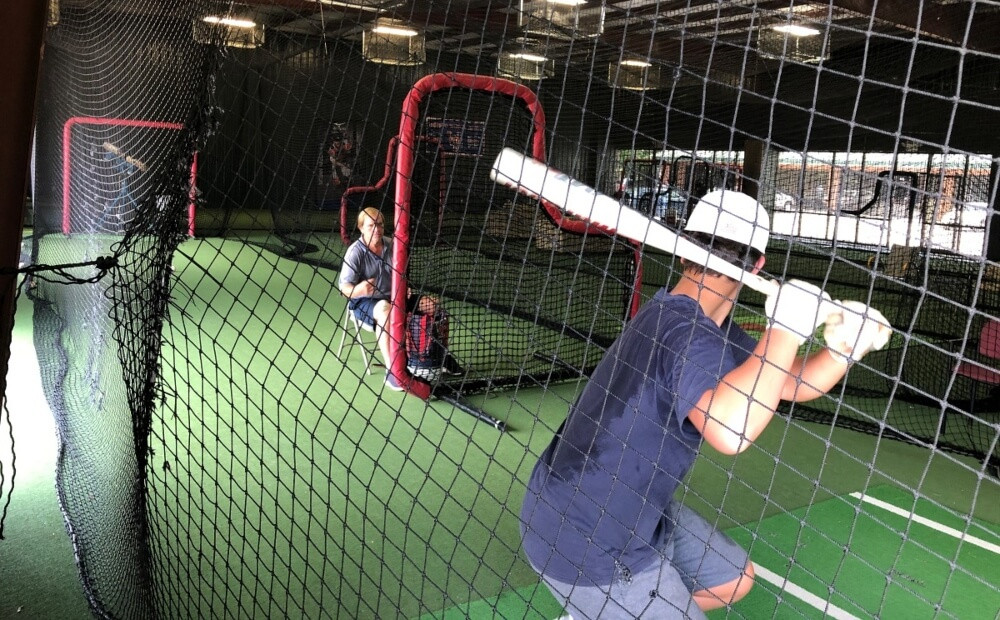
VB: So I don't need to be a baseball specialist?
HM: No, you need to be supportive if you support your son or daughter in whatever endeavors they do. Your son was a lacrosse player. You supported one hundred percent. You had your ups and downs, good games, bad games, good coach, bad, all that stuff. But you support him 100 percent.
VB: Do they start playing games at this age?
HM: Oh, absolutely. Yeah. We play once a week. Yes. Well, I'm affiliated with a place up here called Hopewell, but they play twice a week and practice once a week. So even a six-year-old is going to be at two games and practice. And then a lesson with Howie we hope. There's four days a week of baseball and which is a lot for a six, seven-year-old. However, the real good ones, if they get that baseball bug, softball bug, they want to do it every day.
VB: So, Brian, was six, starts minor league, do you see already a difference with him saying, hmm he's good?
HM: Yes. If their motor skills are better, but they're their skill set up here is better. They're starting to understand, hey, I want to be good at this game. I always tell people who come in. There's nothing fun about baseball unless you're good at anything in life. You're a successful businessman. It's fun. You get up in the morning, you get a nice business, etc.. Same thing with baseball if you're good baseball, a lot of fun. If you strike out every time, it's not fun. And that's where we lose kids to other sports when they get to be thirteen, fourteen, fifteen. Which we'll talk about later. Yes, another episode, but it's six, seven, eight, nine four, six, seven, eight. Their motor skills are really starting to generate. I made Brian a catcher. Here's why you're talking about other sports. He was a soccer player. Well, if you know Brian, he was a step slower than the other kids. So where they put him and put him as a goalie, because he just got hit in the face. So when I saw that, you know, in baseball, any body type can play it, that's the beauty of baseball. You don't have to be six foot eight. You don't have to be 300 pounds. You're just a normal guy. However, so we put all the gear on and the third pitch hits him right here. Then here comes the tears. This is going to be the shortest catching career in the history of catching, I think. And then he looked at me, put the mask back on, get back down in his crouch. So in those formative years. You teach a kid how to catch so he doesn't get beat up, he's going to get beat up as a catcher, but you teach him how to catch so he doesn't get beat up as bad.
But those are the years again up here at Hopewell's. They had a five-year-old All-Star team. They got a six-year-old All-Star team. They got a seven-year-old All-Star team. They got an eight-year-old all-star team. So kids are now competing. Now, this is Atlanta, four million people, but they're competing for an all-star spot. And the one thing I want to tell our people in the audience, don't get freaked out if your kid doesn't make the all-star team I only worry if he can’t make the high school team. So your son is seven and doesn't make the all-star team. Is his career over? Goodness gracious, no. Now we've got to go. We got to go to work. We got to get better. And that's kind of what we're more competitive.
VB: Did Brian make the all-star team?
HM: Oh, yes. yeah. He was a pretty good player, he and my oldest son, Brad, were good players growing up.
VB: Can you tell when a kid is six to nine that he's going to make it to the majors?
HM: No. Good. No, no, no, no, no. Absolutely not.
VB: Because you see a lot of afraid parents there. And then, well, you put too much pressure on the kids.
HM: Yes. Yes. If you do that, if you do that to your son or daughter and they don't get that, then they feel like they let the parents down.
VB: Do you know, with a kid, six to nine if they're going to make it to the major?
HM: Oh, goodness, no, no, no, no. Kids develop at different rates. As everybody knows, I never compare apples and oranges. There are guys in the big leagues in my era. There's a guy named Andy Benice, he came from like Indiana. Bloomington. Probably went there is a good pitcher, you know, six, seven inches came out as the number one pick now nineteen seventy-something. So the big thing with your son or daughter, at six to nine is to continue to develop, give them a love for the sport, baseball, softball and continue to encourage them to get better.
VB: Brian, You said he played soccer. Did he keep playing soccer?
HM: He played soccer for he was more, he played soccer a little bit. He played football a little bit. He was a good basketball player, you know, and obviously a good baseball player.
VB: So multi-sport.
HM: Yes, yes. Whatever was on TV.
VB: That's a good way. I mean, now the seasons are, you know, in the world, you have seasons that are always here. Did they play hockey?
HM: Well, we grew up in Atlanta, you know, I mean we have rinks. But no they were not. OK, but in the winter you either play basketball or you play hockey. So we chose basketball. Now you got to do something, as baseball players. Kids have played twelve months of baseball. I think it's too much at this age. I think they need to branch out and play something else.
VB: Any nutrition tips. Did you feed them something special?
HM: yes. When you look at your son or daughter, if they look like they're putting on some weight. Now, most kids, they go this way and then they come in and up, you know, I always tell kids, come in there. I call it style husky. They're husky kids. Yeah, they're out here. They're ready for growth spur. Now, if your son or daughter is overweight, then I think you need to really start counting calories. And, you know, because if you're overweight, it's going to be hard to play soccer, play a sport. Anyway, so, yes, if you get too big, you got to cut down the calories. As a dad or a mother, you know. You keep it. No soda, no sugar, you know. Whatever, you know, cut down on the candy bars, you know,
VB: They do a good job these days. Drinking a lot. Be cautious about it.
HM: Or, drink water instead of soda.
VB: That's very nice. Anything else. Give us a story about, you know, Brian, age six to nine.
HM: Oh, boy. Just you know, we played minor league baseball, as I mentioned before, Little League. He's too young to play Little League. He was able to play minor league because Brad was eight and he was seven. But if your brother played, they let you play, and so we're playing his minor league stuff and it's coaches pitching. And we had a little old grandfather, the pitcher throw him. And I remember sitting in the dugout going, oh, this guy's going to get drilled, you know, like, OK, honey, here you go and two guys come up there, whack the ball at the guy.
So a couple of days a week, we practice a couple of days. Obviously, I would help to coach, groundballs, fly balls, keep him active. We get into the coaching points of this stuff. But instead of when I would go to practice, even at seven or eight years, as a coach, you can't have one guy hitting, you know, one guy catching and everybody else standing around.
So I'm sure one day for SportsEdTV we will do a practice organization plan where you keep all the kids moving so there's no standing around. The one thing I hear about, it's six to nine with kids, male or female. Baseball's boring because they get a coach and they're standing in feeling like there's no action and in practice, you got to keep them moving, and going in the game should be the fun part. And practice should be harder than the game, which makes no sense to anybody. But if you do it at this age and you don't know how to have practice and you keep the kids moving, they'll be tired in an hour and a half.
VB: That's what I like about baseball, is every kid plays.
HM: Every kid plays, and every kid's got a chance to be really good because of the body type. Again, I mentioned Brian. I saw him play soccer. He's a step slower, now, as he got into, you know, combines to go to professional baseball and average major leaguer runs seven seconds to 7.2 seconds. He ran like a 7.7 to 7.4. So he's only a step behind. Now, you catch fifteen years in the big leagues. Your speed goes up. If you run under 7.0 you're really fast. I mean, Deon Sanders would run a six to guys like that. My older son Brad ran a 6-6.5 really, really fast for his age and his body type. So if you're an athlete, you can play shortstop, second base, centerfield. OK. If you're not as quick, it's called quarter guys to put your third or fourth so you don't have to move as much if you can't move as well as those two guys and they put you behind the plate.
VB: So very early, you knew what position he was going to play, catching?
HM: Oh, absolutely. What happens with young children when you're playing six, seven, eight is I like you to play all the positions. Your parents are my kids playing centerfield. That's OK. Learn to play the outfield, catch fly balls, learn to play shortstop catch grounders. Go behind the plate if you can. The quickest way to where you want to get his catching because nobody catches. It's the toughest position to play physically. Before you get beat up. But you got to be a tough kid to catch.
VB: That has been great. Six to nine, you know, game, work-out, you know, once a week as a mother or as a dad, just play with your kids in the backyard, in the living room as well, there is no excuse. What else would you like to say?
HM: Well, the big thing for parents and I want to make sure it's seven or eight if you don't make the all-star team, it's not the end of the world, you know, and some parents think it is. And as I said earlier, my goal for a son or daughter is to make the high school team at fifteen. So it's six or seven or eight. You don't know what this kid's going to be at fifteen. And it's we hope they're unbelievably talented, but it's seven. Don't get upset or worried that your kid didn't make the all-star team because hopefully next year he will.

VB: Yeah, I don't put too much pressure. Don't yell during the game.
HM: No. Well, that's easier said than done because everybody's a parent. You want your son.
VB: Well, you know, I remember when I played, you always have this dad on this mom yelling at the kids stick up and do this. Don't coach.
HM: Well, right. You'll laugh at this one. And people that know me to know that I did this. I stood in the outfield. OK, Little League, you know, you're 200 feet away. And I stood in right field and, you know, I stood like this. My hands couldn't go like this. And I just watched the game. I just want to be a dad. This was all the way through. And I really like being a college baseball coach, I knew that the formative years were just formative years. The high school coach is not going to ask your son how many hits he had as a ten-year-old. Because he doesn't care. You know he looks at your son fifteen to make my team. So if you look at it like that, that it's just developing. And that's what I like about SportsEdTV, is we're going to help develop not only kids but coaches and dads and moms.
VB: That's been great. Thank you so much.
HM: Thank you, Victor.
Watch on the road only on SportsEdTV.

